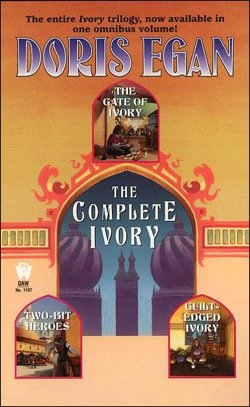It’s hard to explain what makes Doris Egan’s Ivory trilogy such fun. There are serious books and there are frivolous books, and these are definitely in the latter category, but they are none the worse for that. They’re delightful rather than deep, and the world needs more delightful books. There’s not much beneath the surface, but the surface sparkles. It’s funny how we categorise books like this in terms of guilty pleasures, foam baths and chocolates—female guilty pleasures, please note. Nobody says reading W.E.B. Griffin is like knocking back a couple of six-packs in the locker room.
The dialogue in these books is a thing of joy, and Egan even makes the romance plot work. The first book, Gate of Ivory, is the best, and it stands alone sufficiently that it doesn’t really need sequels—but it has sequels, Two Bit Heroes and Guilt-Edged Ivory, and they’re lovely. I refuse to feel guilty for finding them utterly enjoyable. Sometimes that’s all the justification you need. These are books with a very high “I want to read it” quotient, they’re hard to put down, they have great characters, and they’re a ton of fun.
These are science fantasy, in the same kind of genre as Doyle and Macdonald’s Mageworlds books. And there are investigations in all the books, which makes them kind of mysteries. There’s also a romance, but they’re a long way from being genre romance. There are adventures and hairsbreadth escapes and sorcery and spaceships. It’s still hard to pin down what makes me like them so much.
No spoilers beyond what might be on the back of the first book.
It’s partly the voice—Theodora of Pyrene’s first person retelling of the adventures she never wanted to have. She’s charming and funny and loyal and she keeps on going. She’s an adorable person to spend three books with. The voice grabs you from the first moment.
It’s partly the world. Worlds, that is. There are four planets in the sector. Theodora was born on collectivist Pyrene and grew up on scholarly Athena, she got stranded on Ivory, and although we only really see Ivory the other planets are really important—even Tellys, the world Theodora never sees, the world with higher tech than the others and a stranglehold on sharing it. Ivory is the only world where magic works, though it’s very complicated magic of a kind more likely to get you into more trouble than out of it. Egan has clearly thought through the magic and the economics and the culture and politics and the way they intersect. Theodora is on Ivory but she’s not of Ivory, she’s frequently horrified by the Ivory way of doing things—but she’s also being assimilated. She’s even falling in love. And that’s the other ingredient that makes these books delightful, the sorceror Ran Cormallen, the laugh aloud repartee, and the romance plot.
Theodora of Pyrene, robbed and abandoned on Ivory, is determind to cling to her Athenan ideals and earn enough money to get back home. She’s faking reading cards in the market place when Ran Cormallen offers her a job reading cards for him. The job has strings he doesn’t explain, of course, involving his family, a curse, and a feud. That’s just the beginning—and Theodora goes straight forward through the plot, she knows she’s a barbarian in a world where family and etiquette are everything. What she wants to do is study comparative folklore… but when people call her “tymon” which means “unmannerly barbarian” she adopts it as a nickname. And she studies whatever comes along, with intelligence and determination.
One of the more unusual things Egan gets right is the physical learning—Theodora learns an exercise called “the river” and a form of massage called “tinaje,” and the description of learning them and the physicality of them is really notably good. (I’m not saying she isn’t good at writing highwaymen and sorcerous duels, but they are things one finds done well in fiction more often.) There’s also a wonderful grandmother in the first book, and Egan seems to be aware of the existence of people of all ages and genders and sexual orientations. She’s good on small villages and large cities and how they are different from each other within the broader culture.
In any case, I highly recommend these books. They’re fun and absorbing and I think you’ll find them thoroughly enjoyable. There should be more books like this.
Jo Walton is a science fiction and fantasy writer. She’s published two poetry collections and nine novels, most recently Among Others, and if you liked this post you will like it. She reads a lot, and blogs about it here regularly. She comes from Wales but lives in Montreal where the food and books are more varied.










